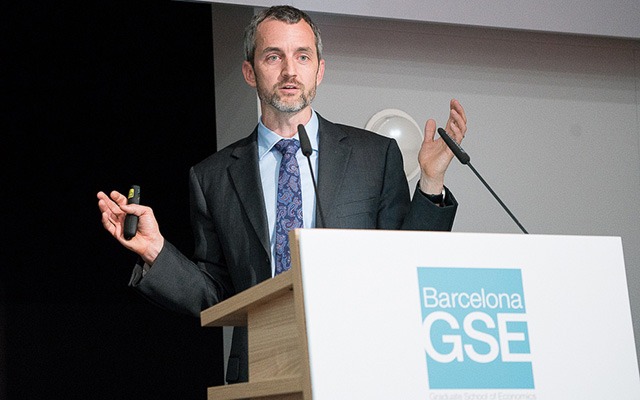research
Fourth Calvó-Armengol prize awarded to Matthew Gentzkow

The fourth Calvó-Armengol International Prize in Economics has been awarded to Matthew Gentzkow (Stanford University). Gentzkow received the 2016 Calvó-Armengol International Prize in an official ceremony on June 14 in Andorra, homeland of the Prize's namesake, Antoni Calvó-Armengol. The Prize activities continued in Barcelona with a two-day workshop for invited researchers and the Calvó Prize Lecture on “Political Polarization and the Media” which was delivered in UPF Balmes.
The Calvó Prize is awarded every two years to a top researcher in economics or social sciences younger than 40 years old for his or her contribution to the theory and comprehension of the mechanisms of social interaction. The prize was established to honor the memory of BSE Affiliated Professor and ICREA-UAB Professor Antoni 'Toni' Calvó-Armengol. He was a beloved member of the BSE community and a highly esteemed researcher from Andorra who passed away unexpectedly in 2007 at the age of 37. Matthew Gentzkow commented that it was a “tremendous, humbling honor to receive this prize and especially to receive it in Toni’s name. Somebody who’s work has been a real inspiration on economics.”
At the Calvó Prize Lecture, Professor Salvador Barberà (UAB and BSE) introduced Matthew Gentzkow by explaining that his work is “an excellent example of the growing scope economics is taking as a social science.” Professor Barberà continued by saying that Matthew Gentzkow “took his research to new heights, turning the economics of the media into a complex field of research, in many directions, developing new methods of analysis to analyze questions of social relevance, not only for economics, but also for politics.”
The lecture delivered by Matthew Gentzkow focused on a specific research project that highlighted the connections between politics and political language that is introduced in the United States Congress. He discussed how this language filters down into the media and then potentially out into the broader discussion. The goals of this particular project were to measure trends in congressional speech over a long time period, from 1872-2009. Professor Gentzkow concluded that when two sides of the political spectrum start speaking in different political languages, this can have an impact on how people think. As a result, it has been observed that we are now speaking languages that are so different, it is contributing to the depth of the broader divisions that we see in society.
Video: Highlights from the 2016 Calvó Prize Lecture
Watch the full lecture on BSE YouTube
View photos from the Prize Lecture
